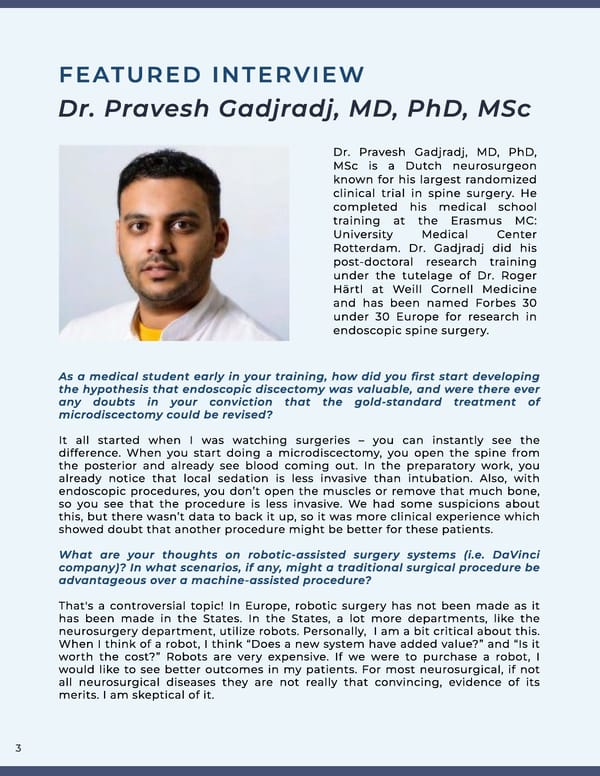featured interview Dr. Pravesh Gadjradj, MD, PhD, MSc Dr. Pravesh Gadjradj, MD, PhD, MSc is a Dutch neurosurgeon known for his largest randomized clinical trial in spine surgery. He completed his medical school training at the Erasmus MC: University Medical Center Rotterdam. Dr. Gadjradj did his post-doctoral research training under the tutelage of Dr. Roger Härtl at Weill Cornell Medicine and has been named Forbes 30 under 30 Europe for research in endoscopic spine surgery. As a medical student early in your training, how did you 昀椀rst start developing the hypothesis that endoscopic discectomy was valuable, and were there ever any doubts in your conviction that the gold-standard treatment of microdiscectomy could be revised䤀 It all started when I was watching surgeries – you can instantly see the difference. When you start doing a microdiscectomy, you open the spine from the posterior and already see blood coming out. In the preparatory work, you already notice that local sedation is less invasive than intubation. Also, with endoscopic procedures, you don’t open the muscles or remove that much bone, so you see that the procedure is less invasive. We had some suspicions about this, but there wasn’t data to back it up, so it was more clinical experience which showed doubt that another procedure might be better for these patients㠀 What are your thoughts on robotic-assisted surgery systems (i.e. DaVinci company)? In what scenarios, if any, might a traditional surgical procedure be advantageous over a machine-assisted procedure䤀 That's a controversial topic! In Europe, robotic surgery has not been made as it has been made in the States. In the States, a lot more departments, like the neurosurgery department, utilize robots. Personally, I am a bit critical about this. When I think of a robot, I think “Does a new system have added value?” and “Is it worth the cost?” Robots are very expensive. If we were to purchase a robot, I would like to see better outcomes in my patients. For most neurosurgical, if not all neurosurgical diseases they are not really that convincing, evidence of its merits. I am skeptical of it. 3
 Penn Healthcare Review Fall 2023 Journal— Sports Medicine Page 7 Page 9
Penn Healthcare Review Fall 2023 Journal— Sports Medicine Page 7 Page 9